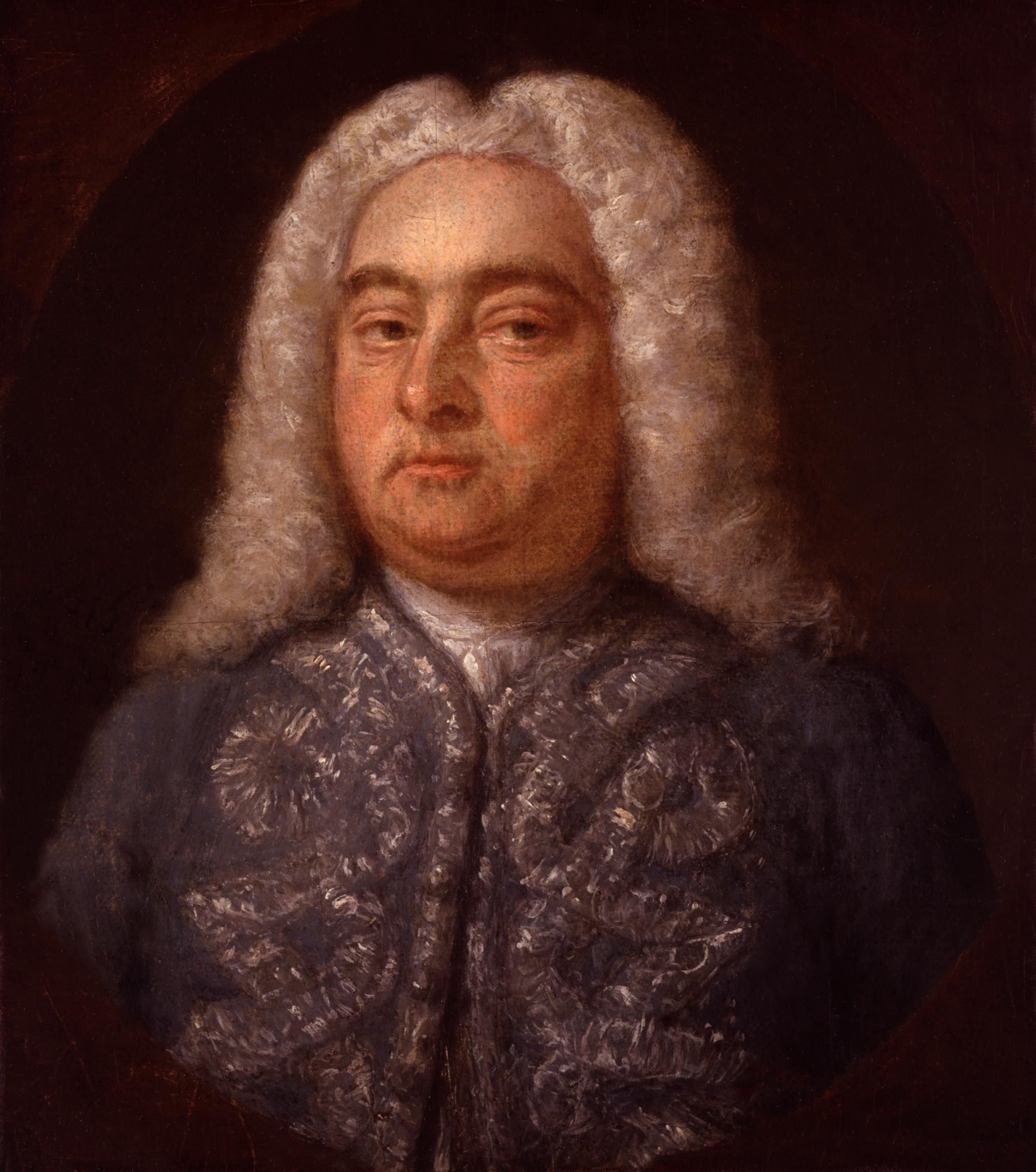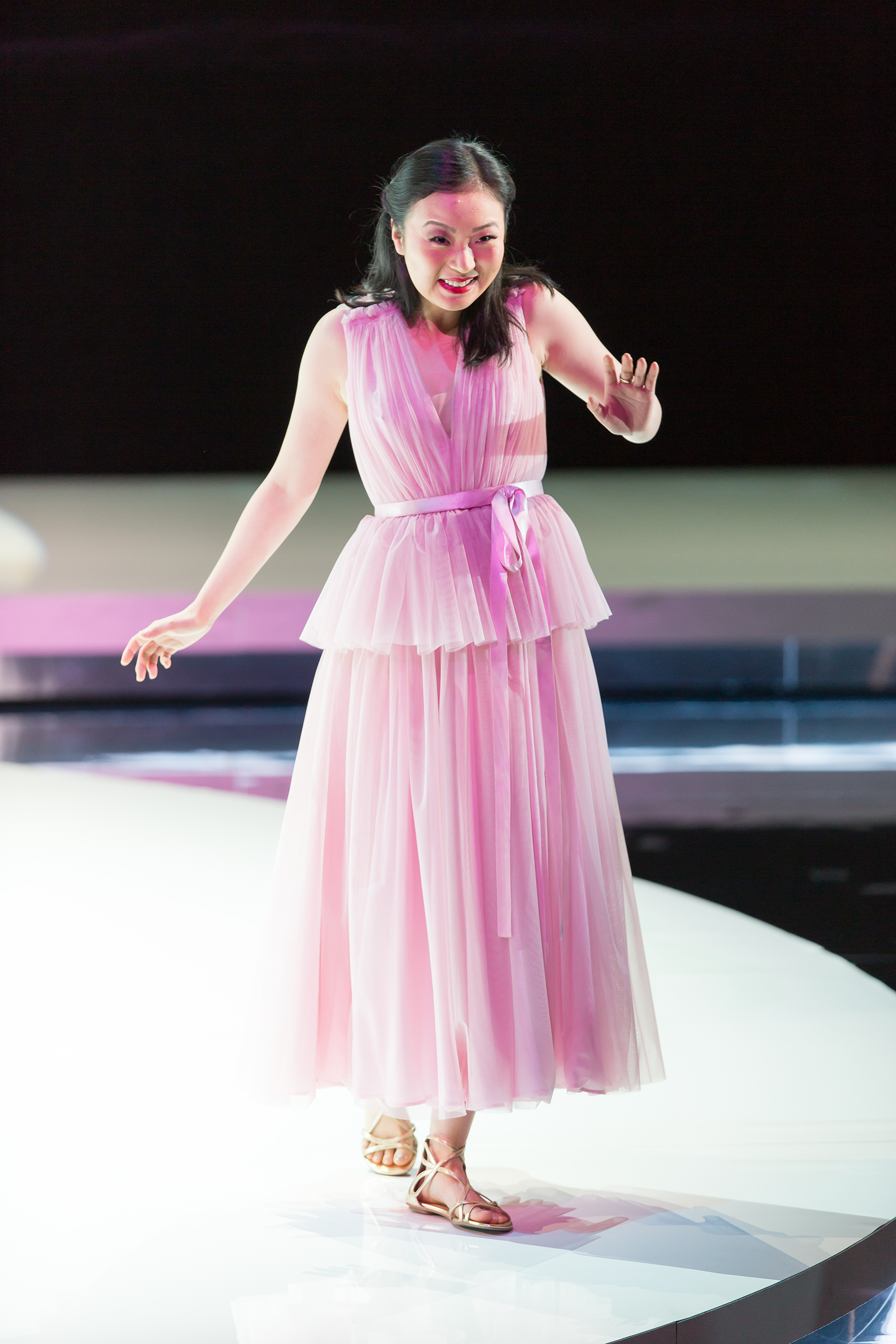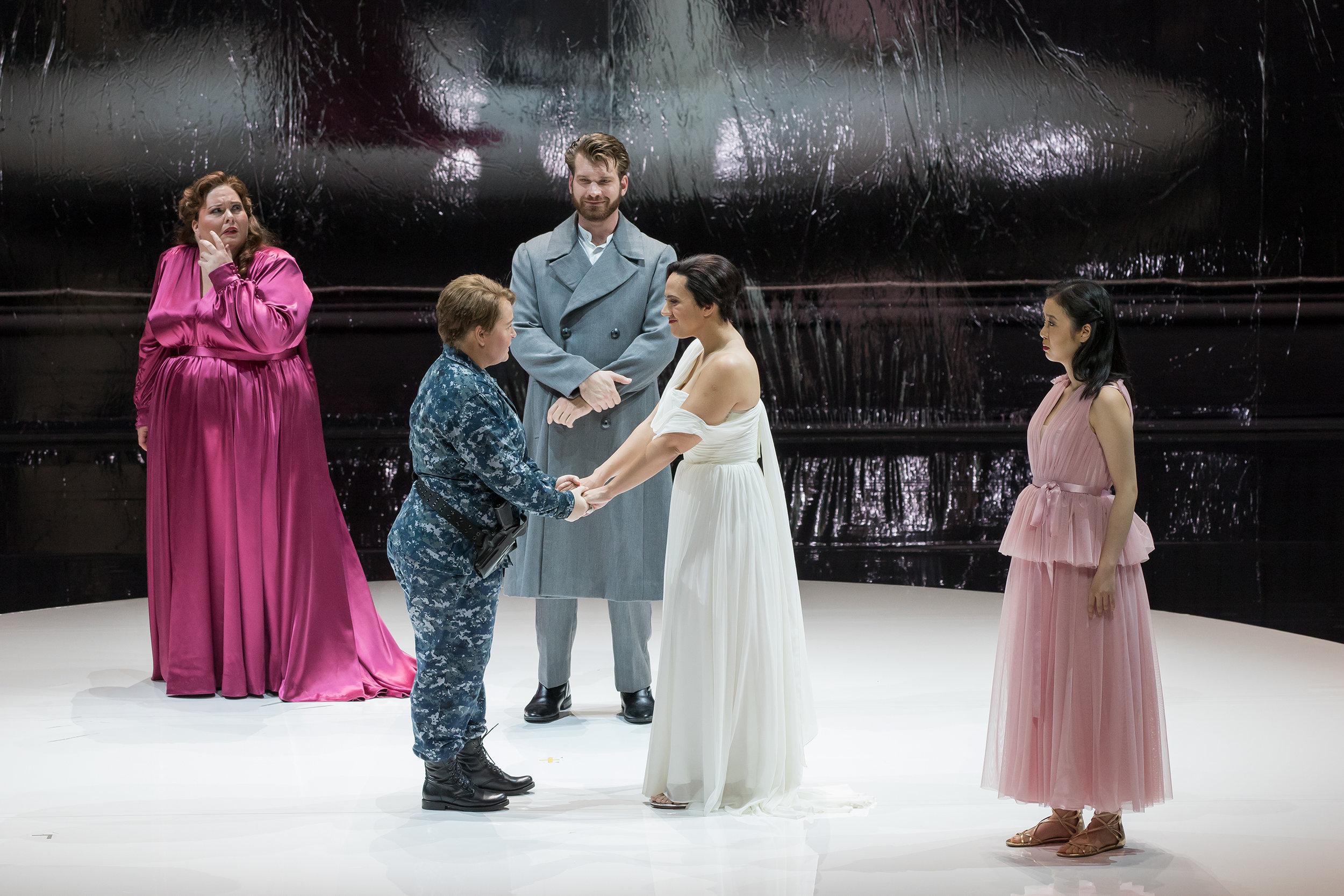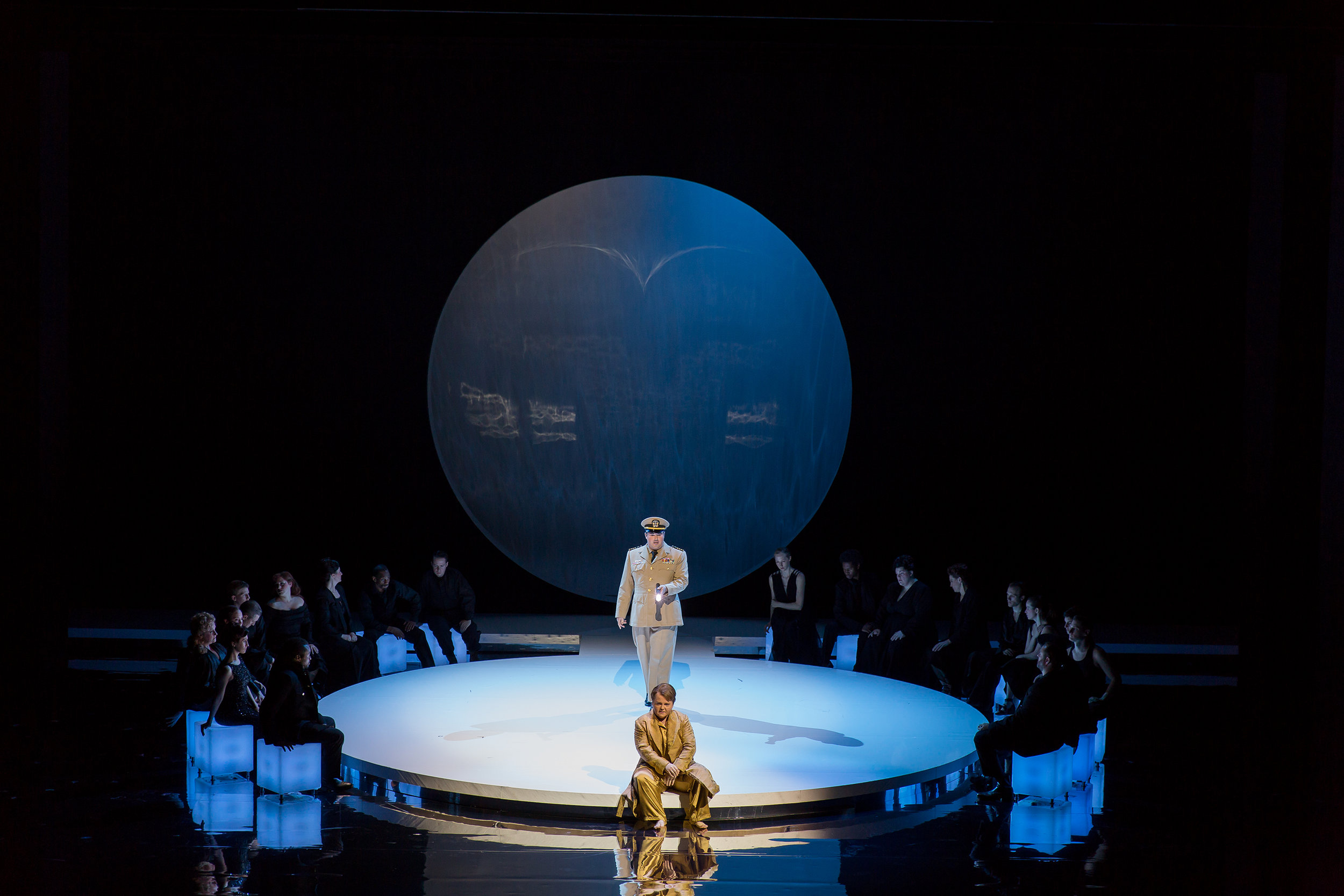I resonate between being enthusiastic about Washington National Opera’s production of Alcina and then again, being somewhat reserved, depending on how I think about it. Let’s work through it. (If I seem a bit fatalistic in this blog report, keep in mind that as I write I am listening to a CD titled “Classical Music for the Zombie Apocalypse” which I somehow stumbled across looking in Apple Music for albums by Barbara Hannigan).
Painting by Francis Kyte of George Frideric Handel. Photo is in public domain in Wikipedia Commons.
Alcina is the opera in this season’s WNO lineup that excited me the most. It is was to be my first baroque opera and my first Handel opera, and the announced cast for this production was outstanding. George Frideric Handel’s life (1685-1759) and his music productivity is an astonishing story in itself. He was primarily an opera composer, though best known in the US and perhaps the world, for his oratorios (e.g., “Messiah”) and his orchestral works (e.g., “Water Music”). Handel was born and educated in Germany, and his first few operas were written and performed with modest success in Germany. He initally supported himself as a violinist. His father had wanted him to study law. A trip to Italy around the turn of the 18th century to explore the flourishing opera scene there lasted over four years during which he further enhanced his education and reputation, composing his first Italian operas. He returned to accept, but did not settle into, a music position in Germany. Instead, he soon traveled with his employer's permission to London in 1710, where he stayed and began to write more Italian operas. Part of his success was his ability to find and entice to London outstanding singers. His was a chaotic career in composition, production, and the opera business; brought to ruination on several occasions by enemies and/or changing times, he was each time reborn a success, a tale worthy of a British mini-series. His life was not without personal conflicts. In his early years he fought a duel that came close to ending his life. It is said that he once held a soprano out a window until she agreed to sing an aria in one of his operas. He produced over forty operas, all with Italian librettos. As the tastes of London moved away from Italian opera, around 1740, he switched from compositions in Italian to mainly composing oratorios with English texts, and over his lifetime completed over thirty oratorios. He lost his eyesight in his last years, but then pursued a successful career as an acclaimed organist and conductor until his final days. His productivity boggles the mind.
Angela Meade as Alcina. Photo by Scott Suchman; courtesy of Washington National Opera.
Baroque opera has a style where the aria’s the thing. This was pointed out by Ken Weiss, Principal Coach of the Domingo-Caftitz Young Artists Program in his entertaining and informative pre-opera talk. The baroque format has the opera move from aria to aria with each singer having the opportunity to display their talent. Recitative and ensemble pieces are given short shrift. This style by its nature imposes limits on storytelling and for engaging modern audiences in the drama. The arias in baroque operas typically follow the da capo form, an ABA form whereby section A of the aria is followed by section B with a return to section A. The cool thing about baroque opera arias is that when returning to section A, the singer is allowed to add flourishes and trills, to dress it up and display the singer’s skills and prowess, sort of jazzing it up if you will. Mr. Weiss said this is also somewhat true for the continuo section of the orchestra so that each production of a baroque opera will be different as different singers and musicians favor their own improvisations. I wouldn’t mind seeing Alcina again to listen more closely for this.
Angela Meade as Alcina, Elizabeth DeShong as Ruggiero, and Daniela Mack as Bradamante. Photo by Scott Suchman; courtesy of Washington National Opera.
WNO’s Alcina excels at the voices and the arias, the focal point of baroque opera; job one is well done. Kudos to Francesca Zambello, WNO’s artistic director for assembling a truly impressive cast of singers, especially the women. Angela Meade, our Alcina, is an established star who easily anchors this production with her powerful soprano, even in the midst of so many highly talented cast members. Ms. Zambello reported that it was Meade's desire to play the role of Alcina that was the genesis of it being produced. I found her performance to ebb and flow in how completely it engaged me. I thought her singing was especially beautiful and forceful towards the end of act one. The other singer I was especially looking forward to is mezzo-soprano Daniela Mack, who I saw recently in The Trial of Elizabeth Cree. She is a convincing Bradamante singing with passion and providing the most convincing acting performance of the evening. As good as Meade and Mack were – very, very good – the stars who shone most brightly for me were mezzo-soprano Elizabeth DeShong as Ruggiero and soprano Ying Fang as Morgana; to my surprise, both had me leaning forward in my seat. I was aware of Ms. DeShong’s reputation, but the clarity and color of her voice was even better than I had anticipated. Ruggerio is a pants role today for mezzo-sopranos, but in Handel's time, the role was given to a castrato; I would not wish that fate on anyone, but I kind of wish I could hear one sing. The other standout for me was Ying Fang who owned the evening from the very beginning. She possesses a gorgeous soprano voice and exudes a winsome graceful charm in playing Morgana. The guys, baritone Michael Adams as Melisso, and tenor Texford Tester as Oronte, acquitted themselves well in their roles. They are both young artists from the Domingo-Cafritz Young Artists program.
left: Ying Fang as Morgana. right: Angela Meade as Alcina, Elizabeth DeShong as Ruggiero; Michael Adams as Melisso, and Daniela Mack as Bradamante. Photos by Scott Suchman; courtesy of Washington National Opera.
I thought the orchestra’s performance was another highlight of the evening. The WNO orchestra is conducted by Jane Glover for Alcina; she is an experienced hand with baroque music. Handel’s music always sounds perfect to me, and it did in her hands. He is the master chef of baroque music. It always has the right amount of salt and pepper, and the finish of each musical phrase satisfies. This production is in the smaller Eisenhower Theater instead of the Opera House, deliberately so to better showcase a baroque opera where the spotlight falls mainly on the singer. Even in the smaller venue, the orchestra sounded a bit light to me in terms of volume; it might have benefited from additional players.
Rexford Tester as Oronte and Elizabeth DeShong as Ruggiero, and chorus. Photos by Scott Suchman; courtesy of Washington National Opera.
Alcina is a quality product, but now it’s time to complain: I think this story actually has possibilities for a modern updating, and therein may be my problem with Alcina. The librettist for Alcina is Ricardo Broschi and it is extracted from Ludovico’s long poem, “Orlando Furioso”, a source for many other operas as well. Alcina is a sorceress who rules an island where she creates illusions and fantasy to control her love life. Ruggiero, a warrior, has been placed on the island to escape his fate but has fallen under the spell of Alcina. Ruggiero’s betrothed, Bradamente, shows up disguised as her brother looking for her lover; she is accompanied by her tutor Melisso. Alcina has a sister Morgana who falls for Bradamente, to the displeasure of her suitor, Oronte. The WNO version was somewhat shortened and a character, Oberto, was deleted, thereby I think, maybe further limiting the storytelling. The plot actually deals with some important themes, but they are not developed in either a gripping or thought-provoking way. Maybe that is just baroque opera for you.
Angela Meade as Alcina, Elizabeth Deshong as Ruggiero, and chorus. Photo by Scott Suchman; courtesy of Washington National Opera.
As a baroque opera, not much staging is required, and director Anne Bogart delivered that, minimal sets and staging, done well for the most part, modern and chic, accented with a quartet of dancers from time to time; kudos also to choreographer Barney O’Hanion. The action takes place on a raised circle of stage with a large circle on the back wall used for shaded images of lighting. On each side were square white ottomans, often occupied by the chorus, which had little to do in this production, though often onstage as props. The chorus members, male and female, each associated with an ottoman, apparently represented the lovers that Alcina had turned to stones, trees, and animals. A mysterious orb appears from time to time that seems to be Alcina’s source of power. A small peeve of mine is the costumes: was there a fire sale not too long ago on military costumes and opera companies stocked up? If all you are going to do to update an opera is put some of the characters in military garb, which I have seen too many times lately, why do it? Traditional staging is fine and updating is often distracting, such as having Bradamente and Ruggiero brandish a handgun from time to time. Ok, I feel better.
Given that important themes of attraction versus true love, the power of illusion, and the pain of disillusionment are present in this story, I’d love to see a version that really updates the story. Why not add some recitative and give the singers a chance to develop their characters? Maybe add a little deux ex machina delight/shock by showing people converted to stones and back. Perhaps just the concept of transmogrification delighted fans of the 18th century, but we live in the super hero/CGI world. If you are just going to update a baroque opera with cosmetics, even artful ones, don’t. Just give the audience the entire opera as it was presented in the 18th century. That at least helps set our expectations for the 18th century.
There you have it. I love the singing and would go back again to hear it if I could make it. Is my longing for something more fulfilling due to WNO’s production of Alcina or just my reaction to baroque opera? I wonder myself.
(By the way, the music on the Zombie CD is quite good, featuring selections from an impressive list of contemporary composers; there is also a volume 2. Oh, also by the way, Barbara Hannigan is giving a Renee Fleming “Voices” recital at the Kennedy Center next Tuesday evening; I have my ticket.)
Fan Experience: Getting to the Kennedy Center from Tyson’s corner on a Saturday afternoon is definitely easier than a weekday, but is not traffic tie-up free. I say this often, but allow extra time, always. I cough up the $20 to use Kennedy Center Parking; entering the lot can be a bit stressful as the QR code reader can be difficult to satisfy. My email confirmation with the code was not downloading on my iPhone when I entered. Finally, staff took my name and phone number and let me enter. From now on, I will take a paper copy. The pre-opera talk began one hour before the performance; it was well worth the effort to get there early; kudos to Mr. Weiss. To my dismay, there was no Alcina coffe mug being sold in the gift shop.







